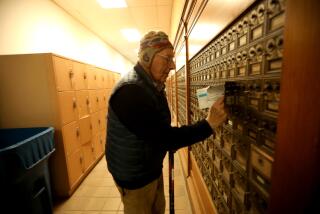Feud Is Not Clock Buff’s Finest Hour
- Share via
The brouhaha that has erupted between Irving Handelman and some of his Fallbrook neighbors is a sort of open-and-closed case that is anything but closed.
It’s a suburban squabble over neighborhood rules and regulations--those covenants, codes and restrictions (CC&Rs;) which, by some notions, bring order and aesthetics to a neighborhood and which, to others, are the bane of a person’s freedom to pursue the life style of choice.
In this case, the issue is whether Handelman can tinker in his garage-turned-workshop with the garage door open.
Handelman is a 72-year-old retired mechanical engineer who restores antique clocks and repairs watches in his converted one-car garage, which he turned into a workshop by putting in insulation, finished walls and electrical outlets. The room is now part metal shop, part clock-display room, and Handelman spends the better part of some days in the room, armed with precision tools more commonly seen in the hands of surgeons and dentists.
He repairs broken clocks and sometimes fabricates, with his metal-working equipment, clock parts to replace broken or lost ones on clocks manufactured 100 years ago.
When he’s out in the garage, he opens the door for fresh air, for light and so he can chat with neighbors strolling down the street.
But not all the neighbors are inclined to chat with Handelman, a squatty man with an upswept mustache and bushy eyebrows who might seem comfortable in suspenders yodeling from the top of the Alps.
Critics say Handelman is blatantly violating the CC&Rs; of the 54-home Fallbrook Village development that, among other things, order that garage doors must be closed unless you’re arriving or leaving in your car, working on your car or otherwise cleaning out your garage.
The lots in the subdivision are only 30 feet wide, and even a one-car garage claims a good third of the frontage.
Aesthetics Affected
Leaving it gaping open, says neighbor Ralph Redhead, sabotages the street’s carefully manicured aesthetics.
Redhead, a retired staff architect for the San Diego Unified School District, says he is sensitive to such blemishes in the neighborhood.
“We have to worry about the aesthetics of the neighborhood. Garages are not a thing of beauty to begin with.”
But Handelman resents the rule, especially because it wasn’t in place when he moved from New York’s Long Island six years ago and bought the new home. The neighborhood association at the time had no problem with Handelman’s garage conversion into a workshop, and neighbors would come by while he tinkered to admire his old clocks, like the 250-year-old timepiece manufactured in Morbier, France, that would be a cornerstone of just about anyone’s clock collection.
For reasons that are not totally clear--Handelman wonders that maybe someone bore a grudge against him--the homeowners association amended the CC&Rs; last year with two revisions: one, that no one own a pet larger than 25 pounds, and another that ordered that garage doors be closed.
Handelman doesn’t have any pets, but he does enjoy opening his garage door as he whiles away his time over his timepieces.
Vote Count Kept Secret
The CC&R; amendments needed approval of a majority of the homeowners, and the board of directors said such a majority was achieved in the mail-in ballots. Wells McTaggart, president of the association, said he wouldn’t disclose the actual vote count, however, and Handelman is dubious that such a majority was achieved.
In any event, the amendment went into effect at the start of the year, and Handelman refused to honor it.
“I was the only guy on the street who was keeping his garage door open, but no one ever complained to me,” Handelman said.
But, on March 14, he received his first official letter from the homeowners association’s board of directors, warning that he was in violation. Subsequent violations would bring a fine of $20 and, Handelman was told, he would be found in violation once a week until he closed the garage door.
Handelman hired an attorney, who fired off a letter claiming that, since Handelman had converted his garage into a workshop, the garage door definition didn’t apply to him.
“I understand McTaggart got mad as hell,” Handelman said. McTaggart declined comment on the case, except to say it has gotten blown out of proportion. “This is a small matter in a small, private community,” he said.
In any event, the directors wrote Handelman another letter. Garage or no, they said, the garage door is a garage door.
Missives Continue
More letters flew back and forth. In one exchange, Handelman included copies of letters from three local real estate salesmen saying an open garage door would not effect property values on the street and, in fact, might enhance them because it showed the friendliness of the neighbors who chat with one another up and down the street.
Handelman also forwarded a petition to the board of directors, signed by 37 of the 54 homeowners, saying they didn’t mind the open door.
One such ally is Jim Vanderveen, who lives across the street from Handelman.
“I understand the intention of the rule, but Irv only has his door open when he’s out in his garage working,” Vanderveen said. “He’s not abusing it. When I heard he was fined, I thought that was absolute nonsense. A little common sense would go a long way around here.”
Still, the board of directors sent another letter to Handelman July 5, this time fining him. It noted that, if he didn’t pay the fine, a lien would be placed on his property.
Pet Exemptions Noted
But Handelman still isn’t closing the door when he works in the garage. He claims that, even if a majority of fellow homeowners approved the revised CC&Rs;, perhaps without reading all the fine print, he should be exempt because he purchased the house with the intent of working in his garage--with the door open--before the CC&Rs; were amended. After all, he says, there are a couple of folks on the street who had large pets before the new 25-pound limit was ordered, and they have been allowed to keep their dogs.
McTaggart said he wouldn’t say what the next step in the garage door battle is, except that it may end up in court. That would be fine by Handelman.
“Some laws can’t be abided by until the day you die,” he says. “That’s why we have courts. I will not pay the fine.”
He says he’ll wait and see what the board of directors does next. He’s got the time.
More to Read
Sign up for Essential California
The most important California stories and recommendations in your inbox every morning.
You may occasionally receive promotional content from the Los Angeles Times.










